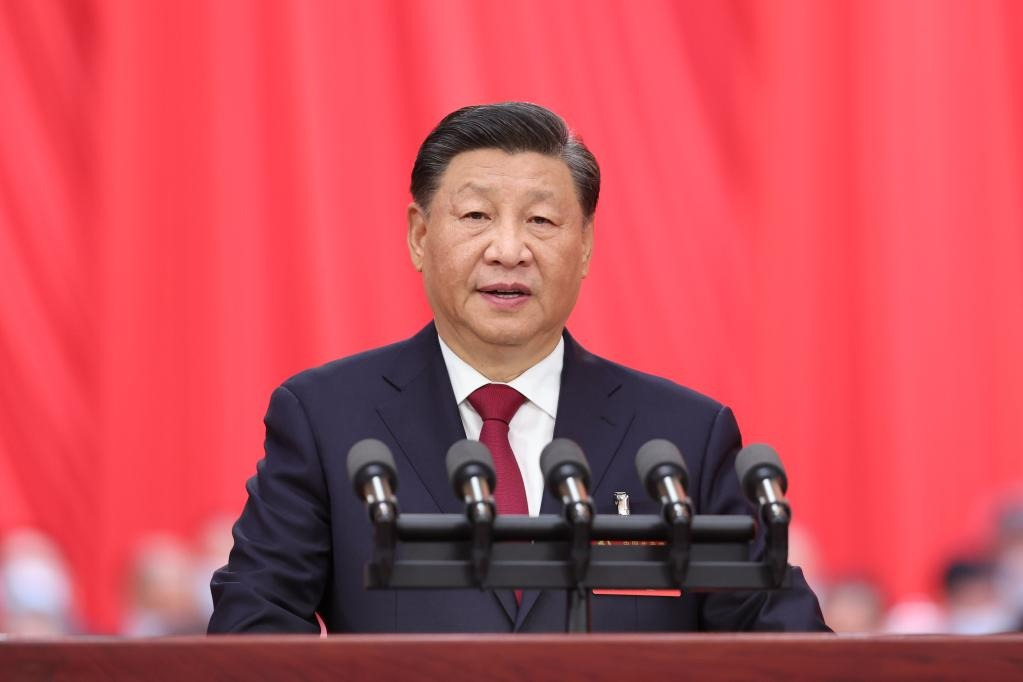Chinese President Xi Jinping lays out the policy priorities at the 20th party congress opening
Mon 17 Oct 2022, 10:32:09

Beijing: Chinese President Xi Jinping on Sunday laid out the larger policy contours for the next five years and summarized the party’s achievements in the past five years as the weeklong 20th party congress of the ruling Communist Party began in Beijing. Xi, 69, is widely expected to win a third leadership term at the conclusion of the week-long congress, cementing his place as China’s most powerful ruler since Mao Zedong.
In his tone setting speech for more than one and half hours, President Xi called for accelerating the building of a world-class military with a strong emphasis on security, touted a patriots-administered Hong Kong as an achievement, renewed the determination for unification of Taiwan and defended the controversial zero COVID policy. Experts said that his speech reflected the continuity of his policies in last 10 years.
President Xi Jinping said Beijing has started a great struggle against separatism and foreign interference in Taiwan. He said that China will never renounce the right to use force but will strive for a peaceful resolution of Taiwan issue. Taiwan, which China considers as its own territory, responded that it will not compromise on its sovereignty or on freedom and democracy.
Xi said China will “intensify military training under combat conditions, laying emphasis on joint training, force-on-force training and high-tech training”. He said China will become more “adept at deploying our military forces on a regular basis and in diversified ways. This will enable us to shape our security posture, deter and manage crises and conflicts, and win local wars.” He did not elaborate further on “local wars”.
Xi said China will strengthen the safeguards for ensuring economic, major infrastructure, financial, cyber, data, biological, nuclear, space and maritime security. He added that “mechanisms for countering foreign sanctions, interference and long-arm jurisdiction will be strengthened”.
He also called for strengthening the food and energy supplies security, supply chains security and improving the ability to deal with disasters and protecting personal information.
He exhorted that China must be ready to deal with “dangerous storms” in its journey forward as “external attempts to suppress and contain China
may escalate anytime.” He acknowledged the economic pressures from Covid, high energy prices and the fallout from the war in Ukraine. He reaffirmed support for the private sector and allowing markets to play a key role. However, analysts said China’s renewed emphasis on “common prosperity” and focus on “socialist economic system” increases the state control on the economy. Those measures, on top of China’s Covid controls, have made foreign investors increasingly cautious about the potential growth opportunities in the country.
may escalate anytime.” He acknowledged the economic pressures from Covid, high energy prices and the fallout from the war in Ukraine. He reaffirmed support for the private sector and allowing markets to play a key role. However, analysts said China’s renewed emphasis on “common prosperity” and focus on “socialist economic system” increases the state control on the economy. Those measures, on top of China’s Covid controls, have made foreign investors increasingly cautious about the potential growth opportunities in the country.
President Xi also briefly justified country’s Covid policy in relation with the economic development. He did not state whether and when there might be any shift from the stringent policy. Zero COVID policy has become a major headache for China as it has been directly associated with President Xi’s legacy despite causing havoc on the economy, pushing the businesses to rethink their presence in China.
It has become difficult for China to come out of it due to the moral high ground it has taken while much of the world tries to coexist with the coronavirus, which emerged in central China in late 2019. A rare and bold COVID protest banner was displayed in Beijing on Thursday criticising President Xi and zero Covid policy.
President Xi also emphasized that China will continue its push to “Sinicise religion” and to “proactively lead adaptation of religion and the socialist society”. He introduced the campaign to “Sinicise” religions in 2015 to bring religions that do not have traditional roots in China under party control and into line with the country’s culture. There have been allegations of growing persecution of religious and ethnic minorities, particularly in Xinjiang, Tibet and Inner Mongolia.
The 20th party congress is expected to reconfirm Xi Jinping as party general secretary of the party, China’s most powerful post, as well as chairman of the Central Military Commission. His presidency will continue till March next year when new government leadership roles - including the anticipated renewal of his precedency - at China’s state council (the cabinet) will be announced at the annual session of China’s parliament. In 2018, a constitutional amendment removed the two term limits for the Chinese President.
No Comments For This Post, Be first to write a Comment.
Most viewed from International
Most viewed from World
AIMIM News
Latest Urdu News
Most Viewed
May 26, 2020
Do you think Canada-India relations will improve under New PM Mark Carney?
Latest Videos View All
Like Us
Home
About Us
Advertise With Us
All Polls
Epaper Archives
Privacy Policy
Contact Us
Download Etemaad App
© 2025 Etemaad Daily News, All Rights Reserved.

.jpg)
.jpg)
.jpg)






.jpg)


.jpg)
.jpg)
.jpg)
.jpg)
.jpg)
.jpg)
.jpg)
.jpg)
.jpg)
.jpg)
.jpg)
.jpg)

















